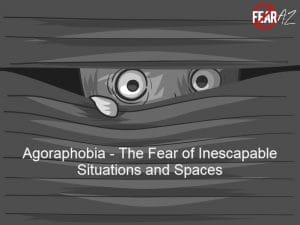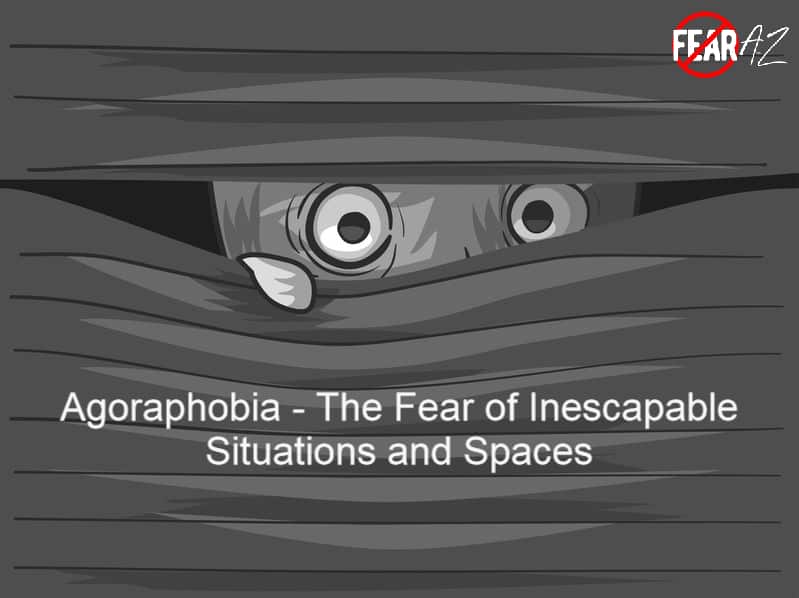Share This Article
Agoraphobia: A Common Phobia
Do you start sweating the moment you need to step out of your house alone?
You do whatever you can to bring a friend along with you. But even then, you can’t let go of them for a second, fearing they might not be around when you need them.
Do you constantly fear being in an embarrassing situation that you cannot get out of?
If you relate to either of these scenarios, you may be suffering from agoraphobia. Though agoraphobia is a fear of inescapable situations, the disorder itself is escapable.
But to control and overcome it, we first need to understand what agoraphobia is and what’s causing it.

Common Agoraphobia Causes
Agoraphobia usually starts to show during the teenage years. Here are some of the most common agoraphobia causes:
Incidences of panic attacks in public
When someone has a panic attack in public, they can develop agoraphobia. The episode itself, the place, and the setting it happened in now becomes the focus of the anxiety and prevents the person from venturing out alone.
Genetics and anxiety disorders
A genetic disorder or medical condition could put a person at risk for developing anxiety disorders like agoraphobia. For example, IBS or asthma. Biological imbalance of the fight or flight hormone, adrenaline, or neurotransmitter issues can also be the reason why your response to stressful situations becomes worrisome.
Environmental factors
This is one of the most obvious agoraphobia causes. If the person has lived in an abusive environment or lost a loved one very early in life, then it could manifest in a fear of uncontrollable situations. Agoraphobics try to avoid unpredictable situations because of fear from a past event that is deeply rooted in their memory.
Below are some situations that trigger a panic attack in an agoraphobic:
- Open spaces
- Enclosed public spaces
- Being alone outside the house
- Crowded public spaces
- Stressful situations in public
The fear intensifies as triggers start to cause panic attacks each time the individual goes outside.
Almost Everything You Need to Know about Agoraphobia
What is agoraphobia? The word agora means “marketplace” and phobia means “fear.” However, agoraphobia cannot be defined as simply as a fear of public spaces. Agoraphobia is a fear of inescapable situations or places where the person feels out of control or unable to escape.
Agoraphobics usually exhibit ‘avoidance behavior’. The person perceives the situation as something unpleasant and decides they need to avoid it. This causes them to minimize their engagement with the outside world. They start staying home and structuring their lives to reduce contact with the outside world. If they do have to step outside their comfort space, they will plan the route they need to take, the place they need to go to, and the person they can take along with them.
They try to eliminate any surprises that may come their way, giving them a sense of control and reducing the chances of any embarrassing situations. They take someone along with them practically as a human shield, so that they have a way out if the situation calls for it.

Females are more likely to have agoraphobia than males. According to statistics, 3.4% of female adolescents have experienced agoraphobia at some point in their lives. That number drops to 1.4% in males. It ranks in the top ten most common phobias around the world.
There is no one answer to what is agoraphobia. There are many types of agoraphobia based on factors like a response to triggers, stress level, and the space or situation.
Symptoms of Agoraphobia
Physical symptoms of agoraphobia might only show up when the person is placed in a stressful situation. Whereas mental/emotional symptoms can appear at any triggering event.
Physical Symptoms
- Difficulty in breathing/hyperventilating
- Feeling nauseous or sick
- Rapid heart rate
- Dizziness
- Trembling or shaking
- Sweating
- Feeling lightheaded or fainting
- Upset stomach or diarrhea
- Panic attack
Mental/Emotional Symptoms
- Fear of leaving home
- Thoughts of being forced out of the house
- Fear of embarrassing yourself in public
- Fear of crowded spaces
- Fear of standing in lines or waiting in a public space
Mental and emotional symptoms are because of the stress associated with the situation and not the situation itself.
How Do You Deal with Agoraphobia?
There is no simple way to deal with agoraphobia. The symptoms may be unmanageable and stop you from enjoying the things you like. Your outdoor activity may decrease, and you may fear situations that could be unpredictable.
While your fear is rational, you also know that the problems it causes cannot be avoided. Which means dealing with it alone is not enough. Thankfully, it can be treated. All you need is a plan, some practice, and perhaps some professional advice.
Self-Help: What Can You Do to Help Yourself?
Agoraphobia treatments don’t just include the management of physical symptoms, but also the mental and emotional ones. You may need to seek professional help and make some lifestyle changes. If you’re worried about seeking professional help right away, then you could start with some self-help exercises to treat agoraphobia at home.
Lifestyle changes
The biggest change you can make is being present. Fear can cause us to distance ourselves from the present situation into the past or the perceived future. To undo this, try mindfulness exercises. Remind yourself that you are safe in the present moment and the threat is irrational or only imagined.
Diet and exercise
This is a big part of agoraphobia treatment. Exercise also forms part of your lifestyle and a daily walk with a friend can open you to recovery. Additionally, you should reduce the number of stimulants you consume, such as tea, coffee, alcohol, or drugs. Try to include something healthier in your diet instead.
Breathing
Phobia or fear is closely associated with the way you breathe. This is why if you can breathe well, you can better calm yourself down. Try to practice breathing as a regular exercise at home. Then try to use breathing to calm yourself while thinking of the triggers.
Relaxation
When you think about the triggers, try to also think rationally and relax. Not just your breath but also your thoughts. Train your mind into thinking that going out alone is a regular, normal, and safe activity—and it will start perceiving it that way. Work on your approach, it will take you a long way.
Get to know your fear better
Agoraphobia treatment will be more effective once you know what caused the phobia. Dig deep into your brain for when you started to develop the fear and why. Was it an event from your past? Your environment?
These questions are also common to psychotherapy, but answering them yourself could help you get clues into what causes the panic/stress and help you avoid the triggers until you get professional help.
Professional Help for Agoraphobia: Options Available
Getting professional help for agoraphobia may involve medication and therapy.
Cognitive Behavioral Therapy (CBT)
CBT works to find a cause, common behavior, and coping mechanisms around the fear. The professional then helps you use your logic and reasoning to deal with the cause. This ultimately reduces your level of fear response until you no longer need to fear going outside.
Medication
If a hormonal imbalance is the reason for your fear responses, then medication could be helpful. By putting your biology back on track, your mind may respond to situations more calmly and naturally.
Learning to Cope with Agoraphobia
It may take time to treat, but that doesn’t mean you can’t learn to better cope with agoraphobia.
Try going out with your friends on short trips near your house in lesser crowded hours and areas. The more pleasant encounters you have, the more your fear goes away. Also try having an open discussion with a close friend. It can help you rationalize your fear about any situation.
And remember: even though you locked yourself in and away from the world, it’s still open to accepting you back when you’re ready. When you do step out, know you are not alone, and the situation is not beyond your control.



